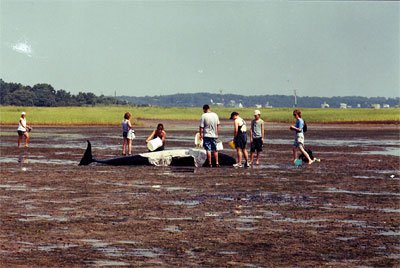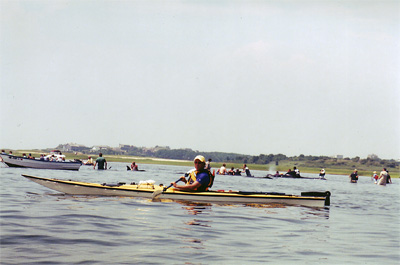 
What began as a day of great anticipation turned out to be one of mixed emotions. My husband and I had just arrived at Wellfleet Harbor and were getting ready for an eight mile paddle out to Billingsgate Island and Jeremy Point. The timing was perfect; it was low tide. As we were loading the kayaks with our gear, an elderly gentleman stopped by and asked if we knew where the pilot whales had beached themselves. We told him that they had beached at Dennis yesterday, but they were rallied out to sea and were fine. He informed us that he had just heard on the news that they were beached again in Wellfleet Bay. I quickly went over to the harbor master to see if this was true. He said, "Some whales are stranded a couple of miles away on the other side of Lieutenant Island." As soon as we heard this news, we were in our kayaks, paddling toward the remote beach. Hopefully, we would find them as we knew this area well.
We arrived about an hour later to see the thirty-one pilot whales stranded on the tidal flats about a half mile from shore. There was very little water anywhere around. They were all covered with wet towels, sheets, and bedspreads ... anything to keep the hot sun from burning them. Volunteers who had gone through the required Cape Cod Stranding Network Training Program were busy pouring water on them to keep them wet and alive. The volunteers had walked two miles through wet marshes to get here. It was not accessible by car. We landed on the wet sand and went to see the whales. One was lying there with large orange writing on it. They had numbered each of the forty-six whales that had been stranded in Dennis the day before. One of the volunteers who was interviewed said that her favorite pilot whale was number thirty-nine. I walked up to see what number was written on this whale. Everyone was in sync, doing what was taught, trying to keep the whales comfortable. I looked and saw with disbelief a big "DEAD" written in orange across its back. It brought tears to my eyes and a lump in my throat.
It is not uncommon to see pilot whales beach themselves, especially on Cape Cod, where the topography and
shoreline are so irregular and shallow. But it is very uncommon to see so many of them at one time. Pilot whales are very social mammals, traveling in pods of 30-50. They weigh from two to three tons and range from sixteen to twenty feet. They are frequently called "gentle giants." They are constantly trying to establish leadership roles and family ties. It was obvious that some of the calves had lost their parents. When whales see trouble they will emit a distress call which will bring other pilot whales to their aid. This can cause the mass strandings of whales trying to help their own.
As we watched for while, we could detect some movement from the whales... maybe a tail moving, but not much. An occasional cry could be heard from the pod, which looked like a big pile of whales. Even when they beach, they stay right together. We could see that the tide was beginning to come in as our kayaks were starting to float. We got in our kayaks and waited for the release of the whales back into the bay and hopefully to freedom. The tide moves in and out extremely fast in Wellfleet Bay. Vast expanses of sand that are exposed will quickly be covered by water in minutes. We could see the water reaching the whales, inch by inch. We sat in our kayaks and waited. Then Katie, one of the leaders in charge of the volunteers, asked us if we would help out. Our first job was to act as "border patrol" and stop the influx of people walking over the flats to see the whales. They didn't want any more onlookers as the tide was rising very quickly and the people would not be able to walk back.
As the tide came in we could see more movement of the whales: tails flailing, water being blown out of their blow holes, and much more verbal activity...both excitement and death cries. There was one baby who kept crying for its mother. It was such a sad sound that I will never forget. We watched as one huge whale that we had named, "Big Guy," really started thrashing about and trying to get into the water. This went on for about ten minutes and then he was motionless... exhausted. Most of the whales were still all together in a pod, many still touching each other. It is customary for each volunteer to be assigned to a specific whale at this time, to stroke it and talk to it and try to keep it quiet until the water was high enough for them to float out to sea. They would then grab each other's arms and make a huge human chain and try to coax the whales out as one unit. As the waters rose, the whales got more excited. You could see some of the volunteers trying to hold them back as they struggled to get into the water.
As the volunteers led the whales out to open waters, we were instructed to paddle back in forth to form a barrier so the whales could not swim back to shore. The volunteers formed a human chain, linked arm to arm, and corralled all the whales inside of it. This way they could control them as a pod and not individually and, hopefully, have more success at getting them out to sea. We could hear the squealing and see all the movement as the whales thrashed about. With hands slapping the water and much yelling, they let go and pushed them out toward the sea. These volunteers had finished the first step as the water was too high for them to continue.
It was up to our small group to complete the rescue. We all thought they would safely swim straight out to the open ocean...just like the day before. We kept paddling, slapping the water with our paddles, drumming the tops of our kayaks... anything to make noise and head them out to sea. Whales don't like noise and will usually swim away from it. Unfortunately, to our dismay, the disoriented pod kept swimming toward shallow waters. Little by little, three hours later, we were the ones drifting back toward the beach along with the whales. At one point two jet skiers were recruited to motor back and forth and try to force the huge mammals out from the bay. But, to no avail, the whales had a mind of their own. By 3:30, we were starving and our made-to-order deli sandwiches were packed exactly where they were supposed to be... in our hatches. Luckily, we had two Power Bars in our PFDs. How much longer would it take for the whales to move on out? We now had about four kayakers, two jet skis and three powerboats making every effort to "Saving The Whales On Cape Cod." The whales were about one to two feet away from us. We could see their eyes as they looked up at us and their faces as they blew out of their blowholes. Pilot whales also have a "smile" that is quite endearing. These mammals just kept swimming around among us all...slowly retreating toward shallower waters.
By 4:00 we had already been there for seven hours and the skies started darkening as a storm was approaching from the east. In the process of helping the whales, we had drifted another two miles down the coast. It would be a long paddle home through the approaching storm. We decided that our safety was in danger so we said goodbye to our new found friends and started to paddle back.
We hurried in to our hotel to see the 6:00 news. This event had made national and international news. About forty minutes after we started to paddle back, the whales had beached themselves for the third and last time. They were confused, disoriented and in shock and couldn't figure out the way to freedom. It was sad when we learned that they had to euthanize them all because none would survive. They just could not make it through another low tide.
We sat on the bed with tears in our eyes, remembering their sounds and vocalizations, their facial expressions and their playfulness in the water. They were never quiet in the water, always talking to us. Their faces had that little smile as they swam by and peered up at us only a foot or two away. What began as a day with great anticipation with the thought of saving the pilot whales yet again, turned out to be one of the saddest days we've ever paddled and one we will never forget.
|

